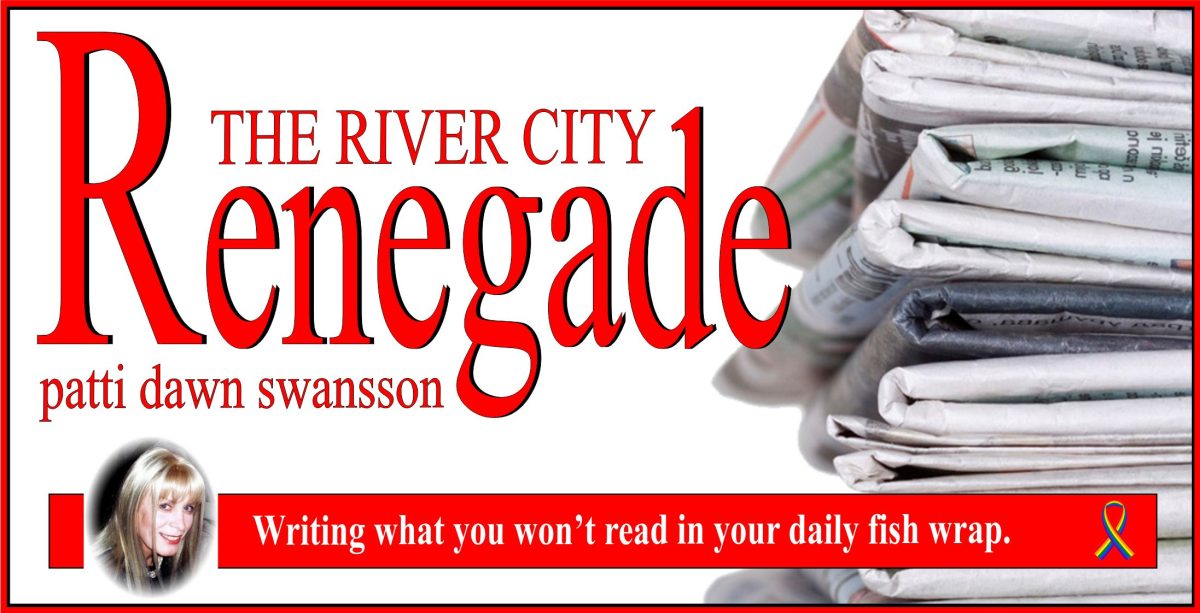Coming out is difficult.
You fret, wondering how many of your family and friends will disengage, and who among the rabble will whisper behind your back or, worse, climb atop a roof to shout out the news that you’re part of the LGBT(etc.) community, making you a target of every hate monger with a creepy and unnatural interest in your dating inclination.
You wonder how many among those hate mongers might lean toward violence.
You also give ponder to issues of employment, housing, medical care, schooling and your next trip to the bakery, hoping the cashier won’t look at you as if you grew a second head overnight or deny you service.
It’s a heavy load, and the weight of worry (some would accurately describe it as fear) seems to be particularly problematic for gay men, most notably professional athletes, and transgender individuals looking for the proper public pot to pee in, the women’s or the men’s.
I have described the coming-out process thus:
“Discovering yourself is the interesting part, accepting yourself is the hard part, revealing yourself is the frightening part that goes bump in the night.”
Fortunately, in our portion of the globe we are spared one scary bit: Prison.
Not so lucky are Moroccans, which is why an aborted natter between a BBC news snoop and national soccer side captain Ghizlane Chebbak at the FIFA Women’s World Cup was excessively dim-witted and exceedingly problematic. If you missed it, this was the exchange:
BBC: “In Morocco, it’s illegal to have a gay relationship. Do you have any gay players in your squad, and what is life like for them in Morocco?”
Moderator: “Sorry, this is a very political question. So we’ll just stick to questions relating to football.”
BBC: “It’s about people. It’s got nothing to do with politics. Please let her answer the question.”
Actually, make it two red cards, one for remarkable nitwit-ism and the other for being—to use tennis legend Martina Navratilova’s word—a “wanker.”
You can go to prison for being gay in Morocco, one of 68 countries on our big, blue orb in which homosexuality is a felony. It’s outlined in Penal Code 1962, Article 489 Unnatural Acts: “Any person who commits lewd or unnatural acts with an individual of the same sex shall be punished with a term of imprisonment of between six months and three years and a fine of 120 to 1,000 dirhams, unless the facts of the case constitute aggravating circumstances.”
Armed with this knowledge, the BBC dude still expected Chebbak to out her LGBT(etc.) teammates, if not herself, whereupon they would be at risk of time behind bars. Perhaps he believes “Go to jail, go directly to jail, do not pass Go” would make for a boffo marketing campaign.
Maybe he’ll next grill the Nigerian captain, demanding a roll call of lesbians among that country’s 23 World Cuppers, even though outing them could lead to death by stoning.
Except that isn’t the story you chase, and not simply because it could lead to dire consequences. It isn’t the province of a news snoop to out anyone, let alone the principals on a global sporting stage.
Coming out is a difficult, delicate decision, and you don’t want some nameless goomer with a pen and notepad doing it for you, not unless it’s at your beckoning. It needs to be your call, on your timetable, just as it is for all in the LGBT(etc.) collective. Anything else is irresponsible journalism.
Fans, of course, can speculate, and they do. For example, one New York Post reader suggested that the players in Australia and New Zealand are “mostly a pack of lesbians,” as if that’s a bad thing. What, gay women shouldn’t be allowed to join a kick-about? Is the roller derby rink a more suitable environment? How about the UFC octagon?
The ill-informed musings of the rabble notwithstanding, we know there are 95 out LGBT(etc.) players on the pitch down Under (12.9 per cent of the 32 nation rosters), because they outed themselves on various platforms. And they’re at risk, even in North America.
For the first time ever, the Human Rights Campaign has declared “a state of emergency for LGBTQ+ people in the United States.” It cites the alarming number of anti-LGBTQ+ bills being passed in state legislative houses (more than 500 introduced in 41 states this year) and says “our community is in danger.”
Three members of the American side Down Under are out LGBT(etc.). There might be others still in the closet. If so, I’m sure the BBC will be first to ferret them out. Sigh.


You must be logged in to post a comment.